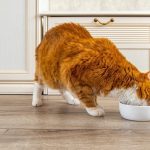Coriander (Coriandrum sativum), often referred to as cilantro or Chinese parsley, is a member of the parsley family and is used in many cuisines around the world. It has a pungent, citrusy flavor with slight sweetness that can be enjoyed both in fresh and dried forms.
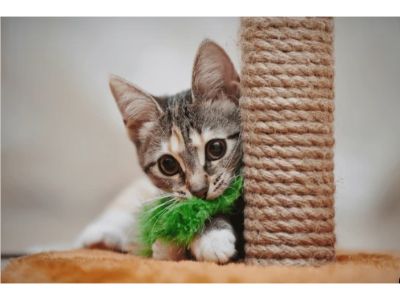
Popular dishes featuring cilantro include curries, soups, stews, salads and more; while leaves are typically used for garnishing purposes its seeds are generally utilized as spices. In addition to being an aromatic ingredient for culinary creations it also boasts anti-inflammatory properties plus antioxidant and digestive benefits, making it not only delicious but also beneficial to one’s health.
It is mainly consumed by humans so one of the most common questions cat owners have is whether can cats have cilantro? Answer to this question is given in the article.
Contents
How Much Is Cilantro Safe for Cats?
Small amounts of cilantro, also known as coriander, maybe a tasty and nutritious treat for cats; however, excessive consumption could lead to gastrointestinal upset or toxicity. To ensure the safety of your cat when introducing new foods into their diet, such as cilantro, it is best to consult with your veterinarian first. Additionally, preparations containing garlic or onion should be avoided since they can cause harm to cats.
Can Cats Eat Cilantro?
Cats can eat cilantro in small amounts and in moderation, but it is not necessary or recommended as part of their regular diet. Is cilantro toxic to cats? Cilantro is not toxic to cats, but it may cause indigestion or an allergic reaction in some cats.
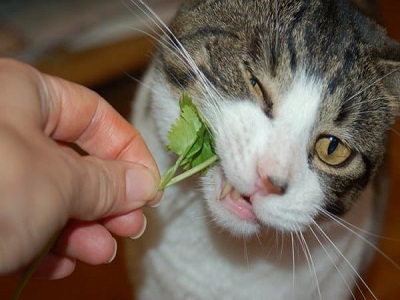
Some cats may also be repelled by the smell or taste of cilantro, making it an off-putting food for most cats. The fact that cats are obligate carnivores means that they must eat meat as their main food source.
Cats love protein-rich foods like cooked chicken or fish, so choose cat-friendly foods when giving them a treat. Always consult your veterinarian before offering new foods, as some cats have health issues or dietary needs that need to be considered.
Does Cilantro Cause Health Problem to Cats?
Is cilantro bad for cats? Yes, cilantro can cause health problems in cats. Cilantro contains essential oils and compounds like linalool that can be toxic to cats. Consuming large amounts of cilantro can cause vomiting, diarrhea, and stomach upset in cats.
It is also possible that some cats are allergic to cilantro, which can cause symptoms such as skin irritation, itchiness and difficulty breathing. In severe cases, an allergic reaction can lead to anaphylaxis, which can be fatal.
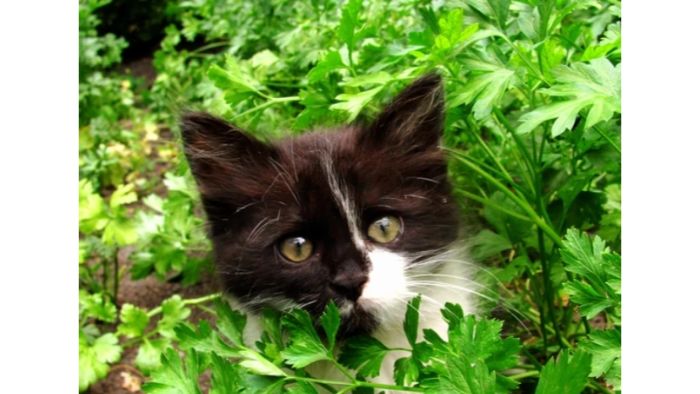
It would be better if don’t feed your cat cilantro or other human foods to cats unless under the supervision of a veterinarian. If you suspect your cat has eaten cilantro or has symptoms after eating it, seek medical attention immediately.
Cats and Cilantro: Health Benefits
Is cilantro safe for cats? Cilantro is safe only if it is consumed in a considerate amount. As stated by thehealthyjournal “cats are attracted to cilantro because of its strong smell.” While there is not much research about cats and cilantro health benefits, the herb does contain certain vitamins and minerals that can be beneficial for feline health. Here are some potential health benefits of Cilantro for cats:
Aids in digestion: Cilantro can help stimulate digestion and ease gastrointestinal discomfort in cats.
Rich in vitamins and minerals: Cauliflower is rich in vitamin A, vitamin C, and vitamin K, as well as iron, potassium, calcium, and magnesium. These nutrients are important for maintaining overall health and well-being in cats.
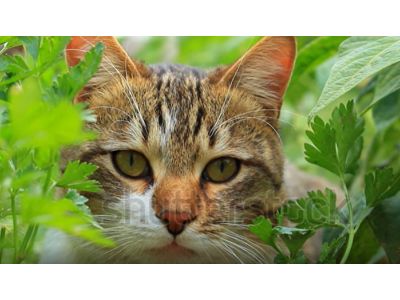
Natural antioxidant: Cilantro contains natural antioxidants that may help you to protect your cat’s cells from damage caused by free radicals.
Anti-inflammatory properties: Cilantro contains certain compounds that have anti-inflammatory properties. This may be helpful in managing inflammation associated with certain health conditions in cats.
Freshens breath: The natural oils in Cilantro can help freshen your cat’s breath, which can be helpful if your cat suffers from halitosis.
Is cilantro Safe or cats? The lesser amounts of Cilantro are generally safe for cats to consume, it’s important to note that some cats may be allergic to the herb. In the event that your cat exhibits any symptoms of an allergic reaction, such as itching, swelling, or difficulty breathing, discontinue the use of Cilantro and consult with your veterinarian as soon as possible. Additionally, it is advisable to consult the vet when something new is going to be added to a cat’s diet.
Frequently Asked Questions
Is there any toxic effect to cat’s after eating Cilantro?
According to thehealthyjournal“cats are attracted to cilantro because of its strong smell.”There is no toxic effect of Cilantro on cats. As long as cats eat in moderation, they should be safe.
What are the risks associated with cilantro for cats?
Generally cilantro is not considered toxic for cats, but some cats may have allergic reaction after consuming it. Along with that digestion problem can also trouble them if it is eaten in excessive amount.
My cat is allergic to cilantro. How can I give cilantro?
You can give your cat cilantro as a small treat or mix it into her food if you want to give her cilantro. Make sure your cat doesn’t suffer from indigestion or allergic reactions by feeding him in moderation.
Are there other herbs that cats can eat?
Yes, there are several herbs that cats can safely eat, including catnip, parsley and thyme. However, as with Cilantro, it’s important to offer these herbs in moderation and watch out for signs of indigestion or allergic reactions.
Should I speak to my vet before giving my cat cilantro?
If you’re not sure if it’s safe to give your cat cilantro or any other human food, it’s always a good idea to consult your veterinarian. They can provide advice on your cat’s nutritional needs and help you create a healthy diet.
Conclusion
Can cats have cilantro? The answer is Yes in a reasonable quantity. Cilantro is not toxic to cats and is safe for them to consume. Cilantro may not be liked by all cats, and some may not eat it because of its taste or smell. Additionally, feeding your cat too much Cilantro or any herb or spice can upset their stomach and cause digestive issues.
Therefore, it is best to give your cat only a small amount of Cilantro as an occasional treat and to monitor their reaction to it. As with any dietary change, it is always recommended to consult with your veterinarian before introducing new foods to your cat’s diet.




